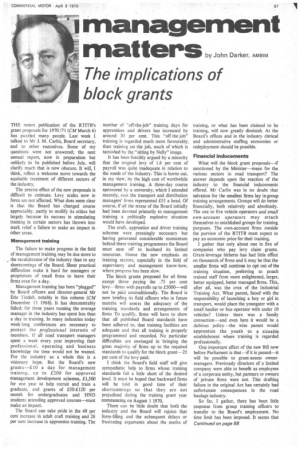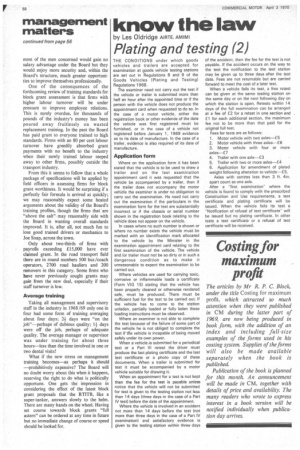management
Page 59

Page 60

If you've noticed an error in this article please click here to report it so we can fix it.
matters by John Darker, Amami
The implications of block grants
THE recent publication of the RTITB's grant proposals for 1970 /71 (CM March 6) has puzzled many people. Last week I talked to Mr J. M. Carlin, Board secretary, and to other executives. Some of my questions were not answered; the next annual report, now in preparation but unlikely to be published before July, will clarify much that is now obscure. It will, I think, reflect a welcome move towards the equitable treatment of different sectors of the industry.
The precise effect of the new proposals is difficult to estimate. Levy scales now in force are not affected. What does seem clear is that the Board has changed course appreciably, partly to mollify its critics but largely because its success in stimulating training in certain sectors has thrown into stark relief a failure to make an impact in Other areas.
Management training The failure to make progress in the field of management training may be due more to the recalcitrance of the industry than to any shortcomings of the Board. Sheer practical difficulties make it hard for managers or proprietors of small firms to leave their firms even for a day.
Management training has been "plugged" by Board officers and director-general Mr Eric Tindall, notably in this column (CM December 13 1968). It has demonstrably failed; for three years running the average manager in the industry has spent less than a day in training. In many industries today week-long conferences are necessary to protect the professional interests of members. If all road transport managers spent a week every year improving their professional, operating and business knowledge the time would not be wasted. For the industry as a whole this is a visionary hope. But the Board's new grants—£10 a day for management training, up to £200 for approved management development schemes, £1,500 for one year to help recruit and train a graduate, and grants of f50-£120 per month for undergraduates and HND students attending approved courses—must make an impact.
The Board can take pride in the 48 per cent increase in adult craft training and 26 per cent increase in apprentice training. The number of -off-the-job" training days for apprentices and drivers has increased by around 30 per cent. This "off-the-job" training is regarded much more favourably_ than training on the job, much of which is tarnished by the "sitting by Nelly" image.
It has been forcibly argued by a minority that the original levy of 1.6 per cent of payroll was quite inadequate in relation to the needs of the industry. This is borne out, in my view, by the high cost of worthwhile management training. A three-day course sponsored by a university, which I attended recently, cost the transport and distribution managers' firms represented £55 a head. Of course, if all the stress of the Board initially had been devoted primarily to management training a politically explosive situation would have developed.
The craft, apprentice and driver training schemes were pressingly necessary but having generated considerable momentum behind these training programmes the Board must ease off to husband its limited resources. Hence the new emphasis on training sectors, especially in the field of supervisory and management know-how, where progress has been slow.
The block grants proposed for all firms except those paying the .75 per cent
levy firms with payrolls up to £5000 will not be paid unconditionally. The Board is now briefing its field officers who in future months will assess the adequacy of the training standards and arrangements of firms To qualify, firms will have to show that all published Board standards have been adhered to, that training facilities are adequate and that all training is properly programmed and recorded. No particular difficulties are envisaged in bringing the great majority of firms up to the required standards to qualify for the block grant-25 per cent of the levy paid.
I think the Board's field staff will give sympathetic help to fu-rns whose training standards fall a little short of the desired level. It must be hoped that backward firms will be told in good time of their shortcomings so that they are not prejudiced during the training grant year commencing on August 11970.
There can be little doubt that both the industry and the Board will rejoice that form-filling and the subsequent delays or frustrating arguments about the merits of training, or what has been claimed to be training, will now greatly diminish. At the Board's offices and in the industry clerical and administrative staffing economies or redeployment should be possible.
Financial inducements
What will the block grant proposals—if sanctioned by the Minister—mean for the various sectors in road transport? The answer depends upon the reaction of the industry to the financial inducements offered. Mr Carlin was in no doubt that salvation for the smallest firms lay in group training arrangements. Groups will do better financially, both relatively and absolutely. The one to five vehicle operators and small own-account operators may attach themselves to established groups for training purposes. The own-account firms outside the purview of the RTITB must expect to pay an economic price for their training.
I gather that only about one in five of companies who pay levy claim grants. Grant-leverage hitherto has had little effect on thousands of firms and it may be that the smaller firms will continue to opt out of the training situation, preferring to poach trained staff from more enlightened, larger, better equipped, better managed firms. This, after all, was the crux of the Industrial Training Act. What parent, faced with the responsibility of launching a boy or girl in transport, would place the youngster with a small haulier or bus operator with under 10 vehicles? Unless• there was a family connection—and even here it would be a
dubious policy the wise parent would apprentice the youth to a sizeable establishment where training is regarded professionally.
One important effect of the new Bill now before Parliament is that—if it is passed—it will be possible to grant-assess ownermanagers. Previously directors of a limited company were able to benefit as employees of a corporate entity, but partners or owners of private firms were not. This drafting failure in the original Act has certainly had unfortunate consequences in the road haulage industry.
So far, I gather, there has been little response from group training officers to transfer to the Board's employment. No time limit has been imposed. It seems that Continued on page 58 most of the men concerned would gain no salary advantage under the Board but they would enjoy more security and, within the Board's structure, much greater opportunities to improve themselves professionally.
One of the consequences of the forthcoming review of training standards for block grant assessment is that firms with higher labour turnover will be under pressure to improve employee relations. This is surely overdue, for thousands of pounds of the industry's money has been poured away fruitlessly on wasted replacement training. In the past the Board has paid grant to everyone trained to high standards. Firms with an 80 per cent labour turnover have greedily absorbed grant payments with no benefit to the industry when their newly trained labour seeped away to other firms, possibly outside the transport industry.
From this it seems to follow that a whole package of specifications will be applied by field officers in assessing firms for block grant worthiness. It would be surprising if a perfectly fair formula is arrived at quickly; we may reasonably expect some heated arguments about the validity of the Board's training profiles, though the firms that • are "above the salt" may reasonably side with the Board in wanting overall standards improved. It is, after all, not much fun to lose good trained drivers or mechanics to Joe Soap, across the town.
Only about two-thirds of firms with payrolls exceeding £15,000 have ever claimed grant. In the road transport field there are in round numbers 500 bits/coach operators, 2700 road hauliers and 200 removers in this category. Some firms who have never previously sought grants may gain from the new deal, especially if their
staff turnover is low.
Average training
Taking all management and supervisory staff in the industry in 1968/69 only one in four had some form of training averaging about four days; 4 days were "on the job"—perhaps of dubious quality; 1+ days were off the job, perhaps of adequate quality. The average manager or supervisor was under training for about three hours—less than the time involved in one or two dental visits!
What if the new stress on management training becomes—as perhaps it should —prohibitively expensive? The Board will no doubt worry about this when it happens, reserving the right to do what is politically opportune. One gets the impression in considering the effect of the latest block grant proposals that the RTITB, like a super-tanker, answers slowly to the helm. There are many hands on the wheel. Having set course towards block grants "full astern" can be ordered at any time in future but no immediate change of course or speed should be looked for.








































































































